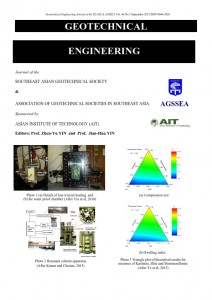Effect of Long-term Aggressive Environments on the Porosity and Permeability of Granular Materials Reinforced by Nanosilica and Sodium Silicate
Main Article Content
Abstract
Colloidal nanosilica is a kind of new chemical grout materials for filling small pores of fine-grained soil. Compared to traditional sodium silicate material, the advantages and disadvantages of colloidal nanosilica should be studied. In this paper, laboratory tests were conducted to study pure gels and sand-gel mixtures of the two materials in terms of long-term volume stability. Samples of Fontainebleau sand injected by nanosilica and sodium silicate were conserved in dry air, water, salt solution and acid solution for 8 different time periods. The shrinkage of pure gels was measured firstly, and then the porosity and permeability were analyzed to evaluate the effectiveness of pore-filling in terms of types of material immersed environments and conserving times. The results show that pure gel of nanosilica is much more stable than pure gel of silicate sodium in all environments studied; from results of porosity, nanosilica does not has manifest advantages compared with sodium silicate; from results of permeability, nanosilica sand has more stable capacity of water-blocking in all environments.
Article Details

This work is licensed under a Creative Commons Attribution-NonCommercial-NoDerivatives 4.0 International License.
Copyright © 2019 Association of Geotechnical Societies in Southeast Asia (AGSSEA) - Southeast Asian Geotechnical Society (SEAGS).


